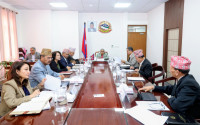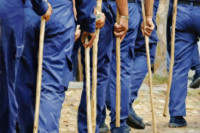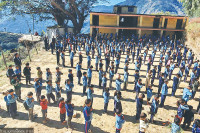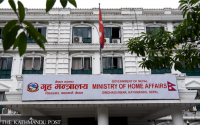National
China urges Nepal political parties to shelve differences and maintain unity and stability
Beijing hopes that all parties and factions in Nepal will bear in mind the fundamental and long-term interests of the country and its people, Chinese Foreign Ministry says.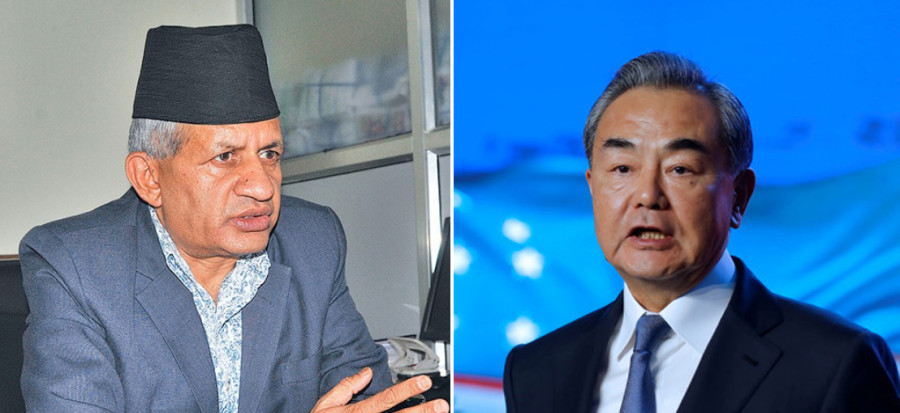
Post Report
China has urged Nepali political parties to shelve differences and maintain unity and stability in Nepal for its own development and prosperity.
According to a press statement issued by China’s Foreign Ministry on Monday, in the context of a recent telephonic conversation between Foreign Minister Pradeep Gyawali and Chinese Foreign Minister Wang Yi, the Chinese Foreign Ministry said that both the ministers exchanged views on Nepal’s domestic political situation, besides extending Covid-19 vaccine cooperation.
On Friday, Gyawali and Wang held a telephonic conversation where the Chinese minister, according to a statement by Nepal’s Ministry of Foreign Affairs, announced that China would provide 500,000 doses of Covid-19 vaccine to Nepal on a grant basis.
The Foreign Ministry statement, however, was silent on discussion over the recent political situation in Nepal, especially after December 20 when Prime Minister KP Sharma Oli dissolved the House resulting in a split in the Nepal Communist Party.
The statement said that matters of mutual interests were discussed during the conversation.
According to the Chinese Foreign Ministry, Wang said that China adheres to the principle of non-interference in other countries' internal affairs and respects the development path chosen by the Nepali people.
“As a friendly neighbour, China hopes that all parties and factions in Nepal will bear in mind the fundamental and long-term interests of the country and its people, seek common ground while shelving differences, and maintain unity and stability, so as to create favorable conditions and environment for its own development and prosperity,” the statement added.
After Oli’s move of dissolving the Parliament, Beijing was particularly concerned about possible political fallout and its spill-over effect on bilateral ties.
Beijing had even sent a four-member team led by Guo Yezhou, vice-minister of the International Department of the Communist Party of China, on December 27, to Nepal “to assess the situation” in Nepal.
The Gou-led delegation had met with President Bidya Devi Bhandari, Prime Minister KP Sharma Oli, Nepali Congress President Sher Bahadur Deuba, Pushpa Kamal Dahal, chair of the other faction of the Nepal Communist, among other leaders.
Gou had urged the Nepal Communist Party leadership to remain united and not go for a split.
During Friday’s conversation, according to the Chinese Foreign Ministry, Gyawali said that Nepal and China are all-weather friends where Nepal appreciates China's support in safeguarding Nepal’s sovereignty and territorial integrity.
Gyawali said that Nepal will continue to firmly adhere to the one-China principle and will never allow any forces to engage in anti-China activities in Nepal, according to the Chinese ministry.
Time and again, Nepali authorities have been assuring the Chinese leadership that Nepal respects one-China policy and will not allow its land against any activities detrimental to China.
“The Nepal government and people are grateful to China's timely and valuable vaccine aid, and stand ready to continue to deepen anti-pandemic cooperation with China,” Gyawali told Wang, according to the statement. “Nepal is ready to work with China to well implement the important consensus reached by the leaders of the two countries, deepen cooperation in various fields and push for further development of bilateral relations.”
Over 20 pacts and understandings signed during the state visit of Chinese President Xi Jinping to Nepal in October 2019 have yet to go for implementation including the Belt and Road Initiative to which Nepal signed up in May 2017.
Wang said that President Xi’s historic visit to Nepal in 2019 lifted the bilateral relations to a new level, according to the statement.
“At the end of last year, President Xi and President Bhandari exchanged letters and jointly announced the new height of Mt Everest or Mt Qomolangma, sending a positive signal about the time-honored friendship and thriving relations between the two countries to the outside world,” the statement added.
The two sides should continue to make every effort to implement the results of Xi's visit to Nepal and promote the continuous development of China-Nepal relations, according to the statement.
Wang said that since the outbreak of Covid-19, China and Nepal have helped each other, strived to work together to defeat the virus, and carried out sound cooperation in the anti-virus fight.
“China has been earnestly fulfilling President Xi’s commitment to making Chinese Covid-19 vaccines a global public good,” read the statement. “China attaches great importance to Nepal's urgent need of Covid-19 vaccines and has decided to provide the first batch of vaccine aid for Nepal and to facilitate its purchase of vaccines.”




 16.88°C Kathmandu
16.88°C Kathmandu